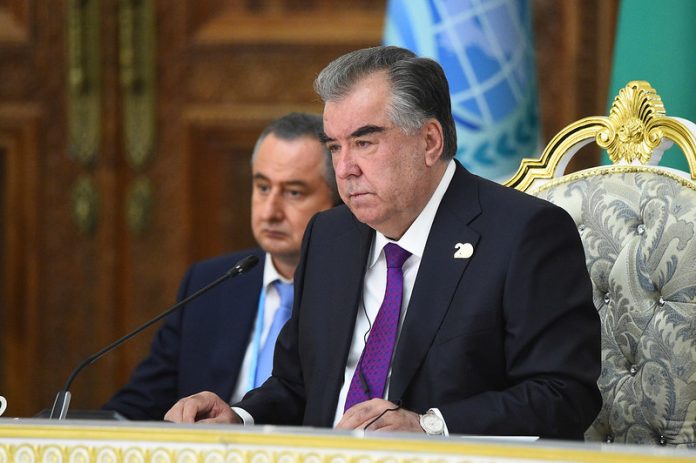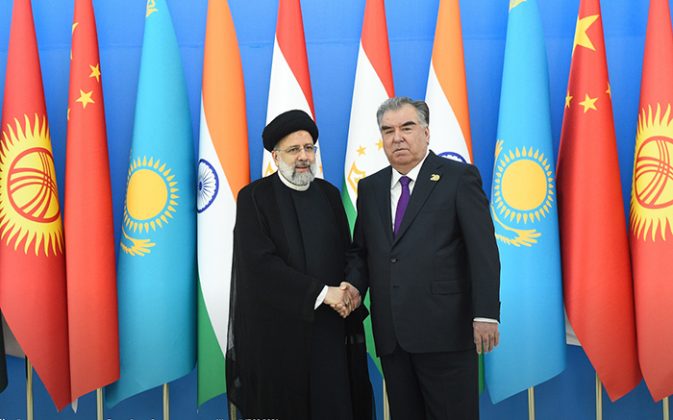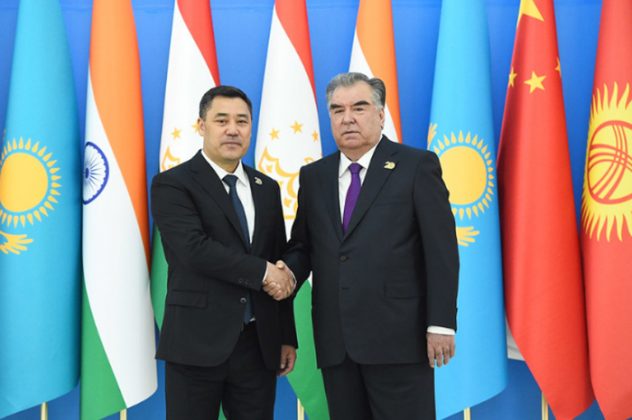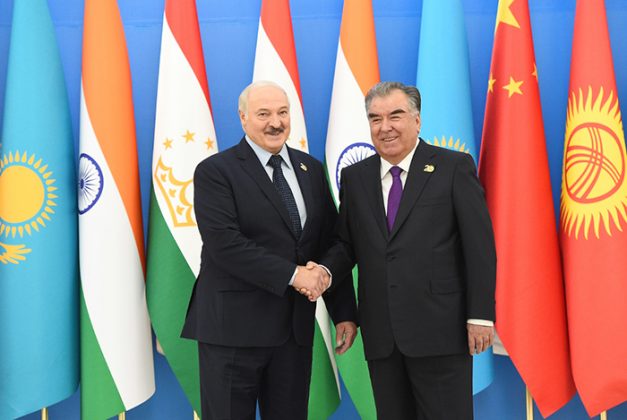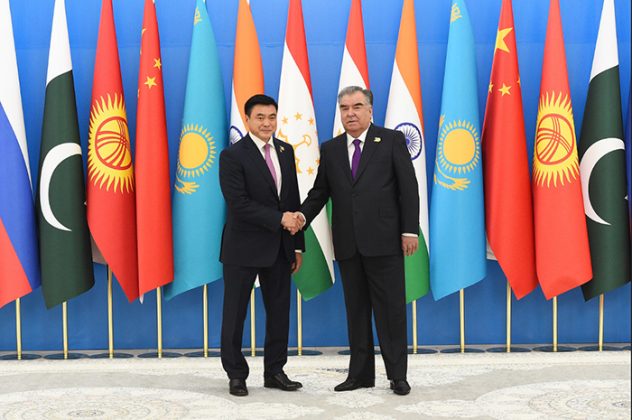Shanghai Cooperation Organisation (SCO) heads meet in Tajikistan
President of Tajikistan Emomali Rahmon chaired the session of the Shanghai Cooperation Organization (SCO) Council of Heads of State that was held in Dushanbe, the capital of Tajikistan on 16 and 17 September, against the backdrop of the organization marking its 20th anniversary.
The two-day summit hosted by President Rahmon was attended in person by the President of the Republic of Kazakhstan Kassym-Jomart Tokayev, President of the Republic of Uzbekistan Shavkat Mirziyoyev, President of the Kyrgyz Republic Sadyr Japarov, and Prime Minister of the Islamic Republic of Pakistan Imran Khan.
Attending the summit online were the President of Russia Vladimir Putin, President of the People’s Republic of China Xi Jinping, President of Mongolia Uhnaagiin Khurelsukh, and the Prime Minister of India Narendra Modi, as well as the UN Secretary-General Antonio Guterres. The heads of SCO observer states, President of Belarus Alexander Lukashenko, and Iranian President Ebrahim Raisi were also present. Turkmenistan’s President Gurbanguly Berdimukhamedow attended the event as an honorary guest.
The heads of delegations of Russia, China, India and Mongolia, as well as representatives of regional and international organizations, including SCO Secretary General Vladimir Norov, UN Under-Secretary-General Natalia Gherman, and SCO Director of the Executive Committee of the Regional Anti-Terrorist Structure (RATS) Jumakhon Giyosov, as well as Chairman of the Board of the Eurasian Economic Commission, Executive Director of the Conference on Interaction and Confidence Building Measures in Asia (CICA), Chairman of the Executive Committee — Executive Secretary of the Commonwealth of Independent States, Secretary General of the Collective Security Treaty Organization, as well as the Secretary General of the Economic Cooperation Organization, also attended the meeting.
Regional and international security, coordination of anti-terrorist activities, strengthening cooperation with observer states, and other important issues were the main focus of the two-day deliberation. The meeting also discussed the organization’s activities through its 20 years of existence, coordination of anti-terrorist activities, strengthening cooperation with observer states, and exchanged views on key international and regional issues, including the situation in Afghanistan.
The summit concluded with the signing of 30 documents and the adoption of the Dushanbe Declaration of the 20th SCO Anniversary. Also, for the first time in the history of the SCO, the anthem of the organization, which was developed and approved at the suggestion of Tajikistan, was played at the meeting.

The joint meeting of the Heads of State of the Shanghai Cooperation Organization (SCO) and the Collective Security Treaty Organization (CSTO), was chaired by President of Tajikistan Emomali Rahmon. The meeting, which was held within the framework of Tajikistan’s presidency in both organizations, witnessed the participation of the Prime Minister of Armenia Nikol Pashinyan, President of Belarus Alexander Lukashenko, President of Iran Ebrahim Raisi, President of Kazakhstan Kassym-Jomart Tokayev, President of Kyrgyzstan Sadyr Japarov, Prime Minister of Pakistan Imran Khan, and President of Uzbekistan Shavkat Mirziyoyev. President of Russia Vladimir Putin, President of China Xi Jinping, and Prime Minister of India Narendra Modi participated online. The Secretary General of the CSTO Stanislav Zas and Secretary-General of the SCO Vladimir Norov were also in attendance.
In a statement issued following the joint meeting, President Rahmon stated that the Council of Heads of State of the Shanghai Cooperation Organization, which was timed to coincide with the twentieth anniversary of the establishment of the organization, was held in an atmosphere of openness and mutual understanding traditionally inherent in cooperation within the SCO.
The statement added: “I would like to express my gratitude to my colleagues, the leaders and heads of government of member states, observer states and our honored guests for their active participation in today’s meeting. Today we discussed the results of the SCO’s activities over twenty years and outlined the tasks facing our Organization for the future. The heads of state voiced valuable assessments and interesting proposals aimed at further enriching the common SCO agenda. We had a thorough exchange of views on joint steps within the SCO to overcome the consequences of the coronavirus pandemic, and discussed topical issues of regional and international cooperation.
The statement added that the Dushanbe Declaration adopted on the occasion, incorporated an analysis of the work done by the member states over the past two decades. It noted that during the summit, considerable attention was paid to the issues of strengthening regional security and countering challenges and threats in the SCO space, and the Program of Cooperation in Countering Terrorism, Separatism and Extremism for the next three years (2022-2024) was approved.
Another important issue tackled at the summit was the problem of the drug threat. In this regard, the meeting adopted a work plan for the implementation of the SCO Anti-Drug Strategy, and agreed to coordinate actions on ensuring international information security and combating cross-border organized crime.
The meeting also attached great importance to the issues of further development and expansion of economic cooperation, noting that the global economy is facing numerous challenges due to the novel coronavirus pandemic. It called for developing and adopting a strategy for regional economic development to 2030.
The summit noted the importance of solidarity in the midst of a pandemic, and the need to develop a legal basis and agree on the smooth operation of the transportation of essential goods.The meeting also adopted a Joint Statement on Food Security that showed the organization’s concern about this threat. In addition, the meeting positively assessed the results of cooperation over two decades in the cultural and humanitarian sphere, and decided to launch a mechanism for declaring each year one or more of the cities of member states as the cultural and tourist capital of the SCO..
The meeting agreed to continue cooperation in science and technology, innovation, education, healthcare, youth, tourism and sports, as well as environmental protection. Within the framework of the Tajik chairmanship, great importance was also attached to the issues of gender equality.
One of the significant results of the meeting was the adoption of decisions on expanding the composition of the SCO family. The summit launched the procedure for admitting Iran to the membership of the Organization, and granted the status of a dialogue partner to Egypt, Qatar and Saudi Arabia. This expansion would result in the SCO space now extending to include 21 states.
During the meeting, the international relations of the SCO were considered, and the significant number of applications from other states for joining the SCO in one status or another was noted. It was also decided that SCO member states will strive to create the necessary conditions for building up interaction with observers and dialogue partners and that the SCO’s cooperation with the UN and its institutions will be strengthened and expanded.
The meeting appointed a representative of China and the Director of the RATS Executive Committee from Uzbekistan to the post of SCO Secretary General. They will begin their duties on 1 January, 2022. The meeting also thanked the current SCO Secretary General Vladimir Norov and the Director of the RATS Executive Committee Jumakhon Giyosov for their effective work. The chairmanship of the SCO then passed to the Republic of Uzbekistan and the meeting assured every assistance in the implementation of all plans for the upcoming chairmanship of Uzbekistan.
At the end of the presentation of the results of the SCO summit, the Tajik President also noted that it was in 2000, at the last summit of the ‘Shanghai Five’, which was held in Dushanbe, that the idea was born to turn this format into a regional structure of multilateral cooperation. It was this signal of the heads of state that served as the basis for the fact that exactly one year later, on 15 June, 2001 the Shanghai Five announced the creation of the Shanghai Cooperation Organization. He added that in light of this historical fact, “we are proud that the summit dedicated to the twentieth anniversary of the SCO is once again being held in our country.”
The key discussion at the summit nevertheless centered around Afghanistan and the ongoing turmoil in that country, which borders several SCO member states. Accordingly, a separate session of the meeting of the heads of the SCO and CSTO member states was dedicated to the situation in Afghanistan. During this meeting, all leaders noted that the current situation in Afghanistan is becoming a key challenge to the security of the SCO and CSTO regions. The summit noted with great concern that Afghanistan is on the brink of a humanitarian catastrophe, as evidenced from the UN data.
During the meeting, the majority of the participants also stated that peace in Afghanistan is impossible without effective steps to form a government on a broad ethnopolitical platform. The heads of the SCO and CSTO member states also noted that the political regime in Afghanistan should rely on the free expression of the will of the Afghan people.
In their declaration issued at the end of the summit, member states jointly expressed their interest in a stable Afghanistan free from terror, war, drugs and poverty. They stressed that the main condition for the transformation of a neighboring country into a peaceful and stable state is the creation of an inclusive government that reflects the entire ethno-political spectrum of society.
The meeting noted that “if a broad inter-Afghan dialogue is not ensured, we can become eyewitnesses of the continuation of the civil war, violations of human rights in all its aspects, the threat of a mass exodus of refugees to all states, including the SCO and the CSTO. It is imperative that the current situation in Afghanistan does not lead to the transformation of the country into a hotbed of international terrorism”.
During the meeting, individual heads of state emphasized the need to provide technical support to countries directly bordering Afghanistan, and agreed that efforts should be focused on preventing a negative scenario in this country.
Following the summit of heads of the SCO and CSTO member states, the President of the Republic of Tajikistan and the Prime Minister of the Islamic Republic of Pakistan, held a separate meeting that focused on the ongoing conflict in Afghanistan. A statement issued by the President of Tajikistan at the end of this one-on-one meeting noted that the negotiations were held in an atmosphere of friendship and absolute mutual understanding.
The Tajik side expressed satisfaction with the results of the high-level negotiations, as a result of which a new package of cooperation documents was signed. The two sides also confirmed the possibility of further expanding trade and economic cooperation, and in this regard, the important role of the Intergovernmental Commission on Trade, Economic, Scientific and Technical Cooperation was recognized. The bilateral meeting also stressed the need to continue partnership cooperation in the fight against global threats — terrorism, extremism, illegal drug trafficking and transnational organized crime.
In addition to trade and cooperation in various fields, the ongoing conflict in Afghanistan was the center of discussions between the two sides. Emphasizing that the current situation in Afghanistan is of concern, Tajikistan expressed its interest in restoring peace and stability in this troubled country. Tajikistan also underlined that the interests of all political and ethnic groups in Afghanistan, including that of Tajiks, must be taken into account and an inclusive government formed with the participation of all social groups.
The statement also called for the speedy elimination of the conflict and tensions in the Panjshir province by declaring a ceasefire and opening roads for providing humanitarian assistance to the population of the region. The one-on-one meeting between the two leaders agreed to direct all efforts to achieve these goals, and to facilitate negotiations between the Taliban and Tajiks in Dushanbe.
For his part, the Prime Minister of Pakistan, Imran Khan noted that “the most important subject and what concerns our two countries most of all is Afghanistan and as Mr. President quite rightly said that it is extremely important not just for Tajikistan and Pakistan that there is peace in Afghanistan, but especially for the long suffering people of Afghanistan”.
He pointed out that the meeting discussed “how we can ensure or try our best that there is peace and stability in the future and that the conflict in Panjshir between Tajiks and Taliban is resolved”. He called for Tajikistan to use its influence with the Tajiks, and assured that Pakistan would “try our best with the Pashtun or the Taliban. We will try our best to resolve the differences through dialogue. And we will urge them that it is important for the sake of Afghanistan that there is an inclusive government”.
Highlighting the importance of forming an inclusive government in a country which is as diverse as Afghanistan, where Pashtuns form 45 percent of the population, but where there is also a huge Tajik minority, in addition to Uzbeks and Hazaras, the Pakistan premier added, “Sustainable peace in Afghanistan can only come if there is an inclusive government; so we will try our best, we will urge, we know we cannot dictate to any other country, but we will try our best and use our influence to urge them as friends of Afghanistan that they must resolve this, especially this issue which is now erupting between the Tajik and the Taliban in Panjshir Valley. And we will also urge them on humanitarian grounds that they must open the blockade so the humanitarian aid can go through.”
Saying that “this is a defining moment in Afghanistan’s history,” President Khan added that, “it can go two ways. It can either go towards lasting peace, which has eluded them for the last forty years, or unfortunately it can go to the nightmare scenario where it can have more conflict, humanitarian crisis, more refugees, and an unstable Afghanistan which could be used for by terrorists. Therefore it is in everyone’s interest that there is peace and stability in Afghanistan. We agreed today that this can only come about if there is an inclusive government, and that all different points of views, factions, ethnic groups, all of them are included in a government which will lead to sustainable peace.”

